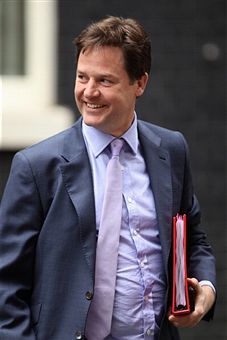 What a curious speech by Nick Clegg to the CBI
last night. Curious, not because it was bad — but because, in straining to give a uniquely “liberal” justification for deficit reduction and the spending cuts, the Deputy Prime
Minister actually crafted an address that most Tory ministers should, and would, deliver themselves. Take his “liberal analysis” of the last decade:
What a curious speech by Nick Clegg to the CBI
last night. Curious, not because it was bad — but because, in straining to give a uniquely “liberal” justification for deficit reduction and the spending cuts, the Deputy Prime
Minister actually crafted an address that most Tory ministers should, and would, deliver themselves. Take his “liberal analysis” of the last decade:
“On a liberal analysis, the last decade represented the worst of all worlds. On the one hand: unchecked private debt; an unsustainable housing market; an overleveraged banking sector; overreliance on City-based financial services while other regions and sectors suffered neglect. On the other: an inefficient state; central government wasting huge sums of public funds, instead of investing to underpin lasting growth; whole communities dependent on the public sector for jobs. Balancing the books won’t, alone, correct that imbalance; we need deep-seated change.”
Or his “liberal vision” for the economy of the future:
“I also want to set out the liberal vision for a new economy: rebalanced so prosperity is spread across all our regions; generated by many more sectors, with more opportunities for people to get ahead — irrespective of the circumstances of their birth.”
Or his account of why liberals believe in sound public finances, which Tim Montgomerie has already given the ConservativeHome Stamp of Approval:
“Yet, critics on the left still feign outrage at the Liberal Democrats for signing up to the deficit reduction plan. Arguing that, while you’d expect a Conservative Government to reduce spending, that isn’t what liberals do. Well we didn’t just sign up to the plan — we co-wrote it, we believe in it, and we take responsibility for seeing it through. No self-respecting progressive should surrender sound public finances, as if they are the sole preserve of the right. It’s true that there is a school of thought, traditionally associated with conservative economists, who feel that cutting the size of the state as a proportion of GDP is a virtuous end in itself. But that is not the aim of this Government, and nor is it a liberal ambition. Liberals have always understood the importance of sound money. William Gladstone, the great 19th century liberal Chancellor and Prime Minister, was emphatic on this point: ‘No Chancellor’, he said, ‘is worth his salt who makes his own popularity any consideration at all in administering the public purse. He is under a sacred obligation with regard to all that he consents to spend.’ That instinct for fiscal prudence is still felt by liberals today, because sound public finances are the key to macroeconomic stability; which is itself the platform for growth and jobs. Because it is a pre-requisite for welfare and social justice. And because balancing the books now is the only way to avoid subjecting our children to years of high debt, higher interest rates, fewer jobs.”
Some suggestive remarks about the “nature and shape of the state” were the closest that Clegg came to distinguishing his party from their coalition partners. But as true as his claim that “cutting the size of the state as a proportion of GDP … is not … a liberal ambition” might be, that is what is happening anyway: total spending, as a percentage of GDP, will be down by about 7 percentage points at the end of this Parliament.
On the evidence of last night, Clegg will struggle to distinguish his party from the Tories when it comes to the economy and public finances, either philosophically or cosmetically. Deficit reduction really is, as he put it, the “glue that binds this coalition together”.






Comments